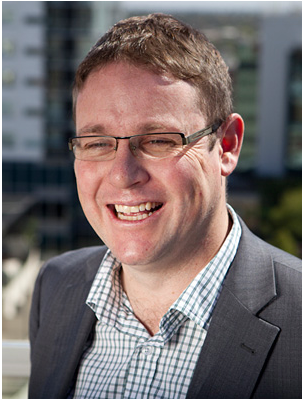No fear: the template for successful SA startups


Excessive red tape is discouraging the risk-taking needed for businesses to succeed.
Many people are likely to believe that present-day Adelaide is incapable of spawning successful new businesses without South Australian Government help. This is not true. On the contrary, with a less-intrusive government, South Australia could be a hot bed of successful start-up businesses.
This article is about a highly successful, recent, management consulting start-up. The business is called BRS, with headquarters in Pirie Street. Its 38-year-old managing director, Kym Williams, founded the company with his wife Nicole in Adelaide in August 2009 as Business and Risk Solutions. In December 2010, Business and Risk Solutions started work with their first New Zealand client. In February 2012, the company’s name was changed to BRS.
BRS and its related entities employ 20 people (including contractors), with the majority residing in Adelaide, although 80 per cent of BRS’s activity is international and interstate. Kym Williams continues to operate out of Adelaide only because he and his wife are South Australian by birth and upbringing. He and his family like living in Adelaide and being close to their families, who reside in country South Australia.
Kym and Nicole were brought up on sheep and cereal farms in Carrieton and Bute. Kym came to Adelaide to study accounting and play district cricket. After university, he worked in the Auditor General’s Department, Arthur Anderson’s, Adelaide City and Charles Sturt Councils (2000-2005) and multinational, Parsons Brinkerhoff in Western Australia (2005-2009), where he became general manager.
In the midst of the Global Financial Crisis in 2009, Kym, then aged 32, decided to go out on his own, because he wanted to be master of his own destiny and was sick of working in public and private bureaucracies. Nicole, a senior project manager in clinical research, was looking for an additional challenge while taking a break from her career to look after their young family.
The excessive degree of business regulation in South Australia stops the risk-taking necessary for the state to thrive by opening up new markets, delivering competitive products and services, and being customer focussed.
Kym and Nicole saw that this was a big step, but rationalised that if the business failed they were employable elsewhere. Kym received a great deal of well-intentioned advice about the pitfalls and challenges of starting a business, especially during the GFC: “Stay in your safe job”; “Why would you leave the security of a global organisation during these times”; “Avoid the risk, keep the titles and seniority that you have”.
But anyone who is an entrepreneur, says Kym, knows that once you have found your dream, you can’t just push it aside, no matter what potential problems may lie ahead. So, the first requirement for a budding entrepreneur is courage.
The second is confidence. When BRS started, Kym thought it was a consultancy business. It is now an entrepreneurial business with 50 per cent of its revenues driven by online training and advisory services. Confidence builds competence and success, Kym believes. He worries that the weakness of the South Australian economy is destroying confidence amongst the younger generation of South Australians, leading to a long-term loss of capability, competitiveness and a willingness to take risks.
Other early lessons Kym learned as a start-up entrepreneur, were:
- Focus, focus, focus – specialise your services and your markets.
- Focus especially on gaining repeat business and referrals from clients.
- Develop a world class culture that maximises collaboration and effectiveness, because this cannot be replicated by your competitors.
- Reward “bricklayers” in the business over those providing sporadic, “heroic”, efforts.
- Emphasise values of authenticity, integrity, passion, pro-activeness, improvement and teamwork.
- Don’t think of what could go wrong, but think of the opportunities and upside of building a great business.
The regulation of businesses in South Australia is built on opposite assumptions. Instead of opportunities driving things, fear drives things. People see risk-taking as leading to bad outcomes and believe that regulation can costlessly stop things going bad. This is not true.
The cost of much regulation is that it also stops things going well. It is far less costly for the community (in terms of foregone jobs and incomes) to allow businesses to innovate with new products and processes and to prosecute those few who do unacceptable damage.
The excessive degree of business regulation in South Australia stops the risk-taking necessary for the state to thrive by opening up new markets, delivering competitive products and services, and being customer focussed. The excessive degree of business regulation in South Australia adds bureaucracy, stifles innovation and gets in the road of businesses delivering good work.
We have become a risk-averse society, Kym says.
Tiny businesses pose even less risk than other businesses by virtue of their tiny size. The case for absolving start-up businesses from red-tape regulation, and substituting outcome-focussed regulation, is very strong.
Kym Williams says that New Zealand, where BRS has won substantial tenders for work, is showing the way forward. New Zealand has deregulated significantly, reduced paperwork massively, and the size and cost of the public service along with it.
The New Zealand Government has instituted word limits on tenders and reports, for example. The huge word lengths of tenders and reports in South Australia have mostly to do with compliance issues that have nothing to do with the matters in hand.
Public servants in New Zealand are responsible now simply for professionally accepting and administering projects rather than mitigating risk by making sure that compliance issues have been met.
New Zealand’s economic performance and unemployment rate have significantly improved as a result.
Professor Richard Blandy is Adjunct Professor of Economics at the University of South Australia.





